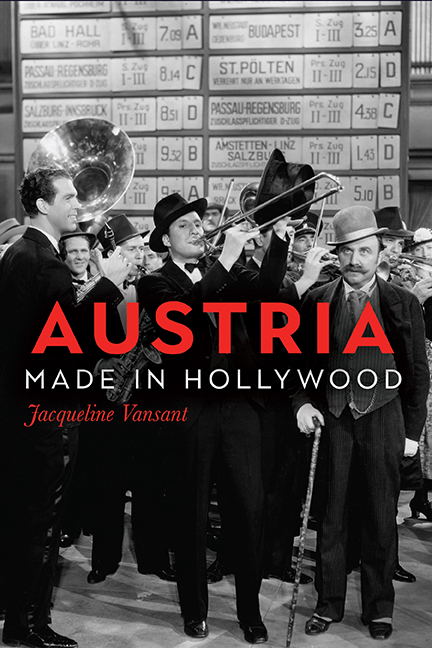Book contents
- Frontmatter
- Contents
- List of Illustrations
- Acknowledgments
- Introduction
- 1 Erich Stroheim, His Austria(ns), and Their US Contexts
- 2 Cross-Cultural Encounters of the Intimate Kind: Hollywood's Americans in Love with Austria(ns), 1932–60
- 3 The Empire Strikes Back: Imperial Austria Fights Nazis, 1938–41
- 4 Reflections and Refractions of the Anschluss on the Hollywood Screen, 1941–42
- 5 Confronting and Escaping History: The Cardinal (1963) and The Sound of Music (1965)
- Conclusion: Hollywood's Austria—Its Past, Present, Future
- Appendix: Hollywood Films Set in Austria
- Notes
- Bibliography
- Index
3 - The Empire Strikes Back: Imperial Austria Fights Nazis, 1938–41
Published online by Cambridge University Press: 04 April 2019
- Frontmatter
- Contents
- List of Illustrations
- Acknowledgments
- Introduction
- 1 Erich Stroheim, His Austria(ns), and Their US Contexts
- 2 Cross-Cultural Encounters of the Intimate Kind: Hollywood's Americans in Love with Austria(ns), 1932–60
- 3 The Empire Strikes Back: Imperial Austria Fights Nazis, 1938–41
- 4 Reflections and Refractions of the Anschluss on the Hollywood Screen, 1941–42
- 5 Confronting and Escaping History: The Cardinal (1963) and The Sound of Music (1965)
- Conclusion: Hollywood's Austria—Its Past, Present, Future
- Appendix: Hollywood Films Set in Austria
- Notes
- Bibliography
- Index
Summary
BEFORE THE UNITED STATES declared war on Germany in December 1941, Hollywood was reluctant to produce anti-Nazi films. Studios feared alienating the German market after the National Socialists came to power in 1933, and producing films openly critical of the Third Reich also posed numerous domestic challenges. Moviegoers seemed particularly skeptical of an industry that had painted the Germans in stark black and white terms during World War I. Consequently, a large portion of the population found the reported brutality of the Germans and the Nazi regime hard to believe. According to the historian Michaela Hoenicke Moore, “Americans had to be convinced by those who identified Nazi Germany as a threat to the United States that there was something newly ominous about that nation.” Homegrown anti-Semitism proved another hurdle. Moore notes, “It was pre-existing attitudes toward Germans and Jews that in many cases prevented the news of discrimination, persecution, and, eventually, mass murder from being taken seriously.” Widespread isolationist sentiment in Congress and among the American population must have also discouraged politically-minded anti-fascist filmmakers. The United States’ involvement in World War I and the disintegration of hope for peace had fed the desire among Americans of all political stripes to stay out of Europe's affairs. Before the United States entered World War II, film industry executives were also concerned that expressly political movies might run counter to the United States’ policy of neutrality.
Little changed after Austria became a part of the German Reich in March 1938. Republican Senator William E. Borah of Idaho captured the sentiment of a sizeable number of Americans, when he “discounted the political significance of Hitler's seizure of Austria and called those who stressed Austria's plight actors.” By contrast, members of the Hollywood community involved in activities to inform the public of the dangers of fascism must have viewed the Anschluss as yet another indication of Hitler's inhumanity and his threat to world peace. Representatives from Universal, MGM, RKO, and Twentieth Century-Fox working in Vienna experienced the Anschluss and the brutality of the Nazis first hand. Universal's Austrian representative William Satori closed up shop and escaped to the United States.
- Type
- Chapter
- Information
- Austria Made in Hollywood , pp. 69 - 94Publisher: Boydell & BrewerPrint publication year: 2019



